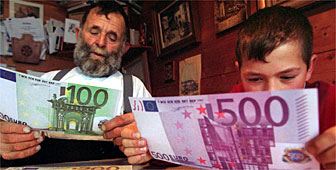Swiss banks ready for e-day

The Swiss Bankers Association (SBA) says the country's banks are well prepared for the launch of the euro at the start of 2002.
Even though Switzerland remains outside the eurozone its banks and financial institutions have been preparing with gusto for the advent of the new currency.
The launch of euro notes and coins on January 1 means that euroland participants will surround Switzerland as the 12 participating euro states give up their national “legacy” currencies.
In the run-up to New Year, many Swiss have been opening euro accounts, particularly those who live close to the country’s borders. Also, with most of Switzerland’s trade done with its European neighbours, business too will be dealing in euros more regularly.
According to the SBA, all Swiss residents who hold bank accounts in legacy currencies have already been advised that these accounts will be changed into euro accounts at the end of the year.
SBA helps banks
James Nason, SBA spokesman, told swissinfo that the association has been busy helping the Swiss banking sector get ready.
“We have a responsibility to help as much as we can and we have for example done a lot of information work,” explained Nason. “We’ve created brochures in all the national languages explaining to the customers when the various deadlines are and also we’ve been helping the banks through circulars, giving them tips.”
However, James Nason admitted that the majority of the work had to be done by the banks themselves.
“The ball really lies in the banks’ courts,” added Nason. If you look at the web sites of the two big banks UBS and Credit Suisse, they both have very extensive pages devoted to the euro explaining what it’s all about and what the deadlines are.”
Clear advice
The SBA’s advice for customers has been clear – get rid of the legacy currencies as soon as you can.
“This is as an incredibly exciting experiment, it’s the biggest currency transformation in modern history, a unique historic event and in the run-up period our information work has focused on advising people on the street what to do with the legacy currencies,” said Nason. “Certainly they should get rid of them as soon as possible, definitely before the end of the year.”
The SBA also wants people to be on the look out for forgeries as the new currency launches.
“It’s believed that forgers will be trying to infiltrate forged legacy currencies into the system at this time so we want to make people aware of the increased possibility of fakes coming into circulation in the run-up period.”
Training time tight
Along with their euroland contemporaries, Swiss banks have also been involved in the so-called front-loading process of euro notes and coins.
But Nason noted that the December arrival of the new currency didn’t leave much time for staff training.
“They only got the euro at the beginning of December so there hasn’t been all that much time to train staff,” said Nason. “But obviously training is going on and staff are being introduced to the currency and being made familiar with it so that they can operate quite quickly when it comes in as cash.”
Capital cost for banks
Banks across euroland have been complaining of the cost of conversion in terms of training staff, customer information programmes and changing over their cash machines.
Swiss banks will also have to meet some of these costs as they become more euro-friendly.
“I think in Switzerland banks will see this as part of their normal capital expenditure,” explained Nason. “I don’t think a huge amount of money is needed for this.”
Smooth start expected
While not wanting to be complacent, the SBA feels that most Swiss are well informed and prepared for the new European currency.
“The Swiss are a very curious and literate people and I think you’ll find that they have informed themselves adequately even though Switzerland isn’t participating in the euro,” concluded Nason. “I can’t see the average Swiss having any problems with this new currency at all.”
by Tom O’Brien

In compliance with the JTI standards
More: SWI swissinfo.ch certified by the Journalism Trust Initiative








You can find an overview of ongoing debates with our journalists here . Please join us!
If you want to start a conversation about a topic raised in this article or want to report factual errors, email us at english@swissinfo.ch.